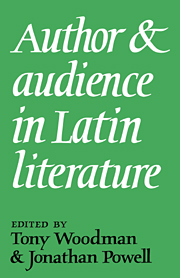Book contents
- Frontmatter
- Contents
- List of contributors
- Prologue
- 1 THE ORATOR AND THE READER: Manipulation and response in Cicero's Fifth Verrine
- 2 STRATAGEMS OF VANITY: Cicero, Ad familiares 5.12 and Pliny's letters
- 3 ‘SHALL I COMPARE THEE…?’: Catullus 68B and the limits of analogy
- 4 ATOMS AND ELEPHANTS: Lucretius 2.522–40
- 5 IN MEMORIAM GALLI: Propertius 1.21
- 6 THE POWER OF IMPLICATION: Horace's invitation to Maecenas (Odes 1.20)
- 7 THE VOICE OF VIRGIL: The pageant of Rome in Aeneid 6
- 8 FROM ORPHEUS TO ASS'S EARS: Ovid, Metamorphoses 10.1–11.193
- 9 POET AND AUDIENCE IN SENECAN TRAGEDY: Phaedra 358–430
- 10 PERSIUS' FIRST SATIRE: A re-examination
- 11 NERO'S ALIEN CAPITAL: Tacitus as paradoxographer (Annals 15.36–7)
- 12 AMOR CLERICALIS
- 13 EPILOGUE
- Notes
- Abbreviations and bibliography
- Indexes
7 - THE VOICE OF VIRGIL: The pageant of Rome in Aeneid 6
Published online by Cambridge University Press: 13 March 2010
- Frontmatter
- Contents
- List of contributors
- Prologue
- 1 THE ORATOR AND THE READER: Manipulation and response in Cicero's Fifth Verrine
- 2 STRATAGEMS OF VANITY: Cicero, Ad familiares 5.12 and Pliny's letters
- 3 ‘SHALL I COMPARE THEE…?’: Catullus 68B and the limits of analogy
- 4 ATOMS AND ELEPHANTS: Lucretius 2.522–40
- 5 IN MEMORIAM GALLI: Propertius 1.21
- 6 THE POWER OF IMPLICATION: Horace's invitation to Maecenas (Odes 1.20)
- 7 THE VOICE OF VIRGIL: The pageant of Rome in Aeneid 6
- 8 FROM ORPHEUS TO ASS'S EARS: Ovid, Metamorphoses 10.1–11.193
- 9 POET AND AUDIENCE IN SENECAN TRAGEDY: Phaedra 358–430
- 10 PERSIUS' FIRST SATIRE: A re-examination
- 11 NERO'S ALIEN CAPITAL: Tacitus as paradoxographer (Annals 15.36–7)
- 12 AMOR CLERICALIS
- 13 EPILOGUE
- Notes
- Abbreviations and bibliography
- Indexes
Summary
The audience which enjoyed the privilege of hearing Virgil read his compositions has bequeathed a fascinating testimonial to his wonderful voice. We need not disbelieve the remark of Melissus, Maecenas' freedman, that he spoke hesitantly and almost like an uneducated man; nor the Elder Seneca that his genius deserted him in prose. But when reciting his own poetry he became a different being, gifted with a voice of sweetness and magical charm. Julius Montanus was so far moved as to confess that he would have stolen some of Virgil's verses if he could only have stolen his voice, expression, and dramatic power as well, for what on the poet's lips sounded splendid became comparatively muted when another read them.
VIRGILS RECITATIONS
It is possible that the voice of Virgil was first heard in a significant way in the autumn of 40 B.C., when to the nobles assembled in Rome for the marriage of Antony and Octavia he recited his epithalamium, the Fourth Eclogue. He had probably met Octavian and Maecenas before, but he certainly did so then, and was ever after held by them in the highest esteem. Nor need we doubt that this was fully returned: in lines 7 and 42 of the First Eclogue the poet unequivocally nails his colours to the mast as a supporter of Caesar's heir.
- Type
- Chapter
- Information
- Author and Audience in Latin Literature , pp. 110 - 123Publisher: Cambridge University PressPrint publication year: 1992
- 5
- Cited by

